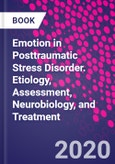Emotion in Posttraumatic Stress Disorder provides an up-to-date review of the empirical research on the relevance of emotions, such as fear, anxiety, shame, guilt, and disgust to posttraumatic stress disorder (PTSD). It also covers emerging research on the psychophysiology and neurobiological underpinnings of emotion in PTSD, as well as the role of emotion in the behavioral, cognitive, and affective difficulties experienced by individuals with PTSD. It concludes with a review of evidence-based treatment approaches for PTSD and their ability to mitigate emotion dysfunction in PTSD, including prolonged exposure, cognitive processing therapy, and acceptance-based behavioral therapy.
Please Note: This is an On Demand product, delivery may take up to 11 working days after payment has been received.
Table of Contents
1. Fear and Anxiety; Anger 2. Sadness/Depression; Shame and Guilt; Disgust 3. Positive Emotion Disruption 4. Neurobiology of Emotion Dysfunction in PTSD 5. Genetic Influences on Emotional Responding in PTSD 6. Psychophysiology of Emotional Responding in PTSD 7. Emotion Regulation Difficulties 8. Distress Intolerance 9. Emotional Granularity 10. Experiential Avoidance 11. Emotion-driven Impulsivity 12. Attention/Information-Processing Deficits in PTSD and Emotion 13. Influence of Prolonged Exposure on Emotion 14. Influence of Cognitive Processing Therapy on Emotion 15. Acceptance-Based Behavioral Therapy for PTSD 16. Self-Compassion for PTSD 17. Emotion Regulation-Based Treatments for PTSD








